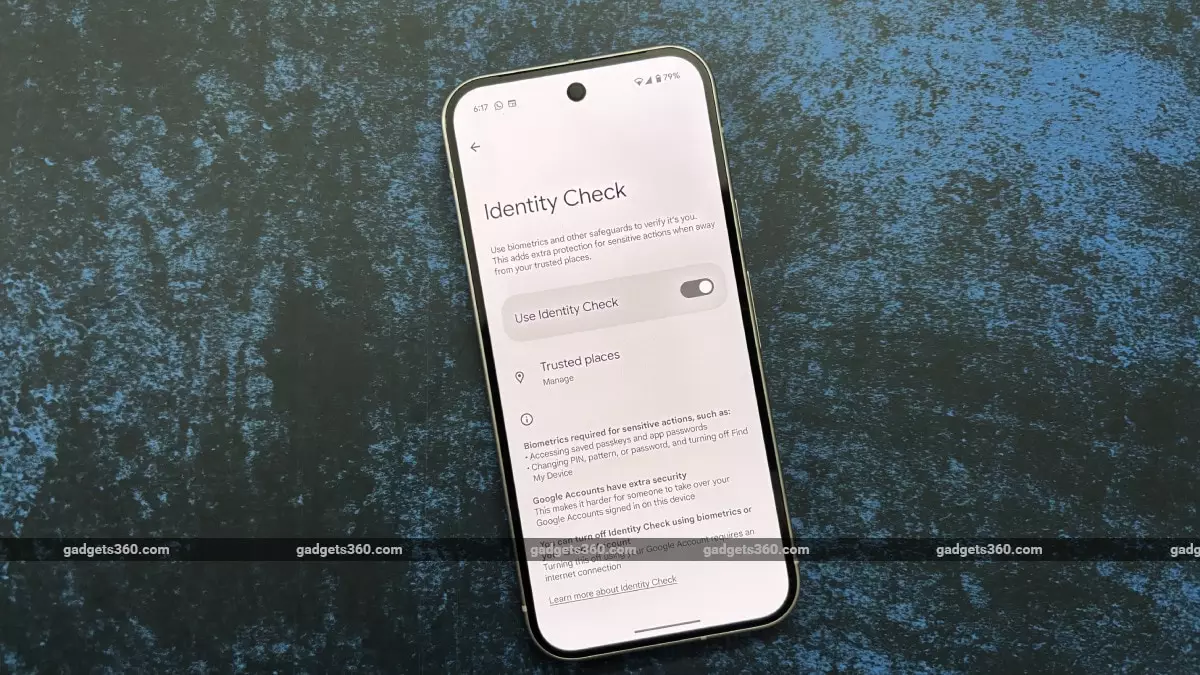In an era increasingly threatened by cybercrime, the necessity for robust digital security measures has never been clearer. As consumers entrust their most sensitive information—banking details, personal communications, and priceless family memories—to their devices, the risks associated with a stolen smartphone amplify. Google’s upcoming expansion of its Identity Check security feature—a safeguard that mandates biometric authentication before users can manipulate critical settings—arrives at a crucial intersection. This initiative could not only transform how users interact with pivotal safety features, but also challenge the existing paradigms maintained by tech giants, particularly Apple.
A Comparative Perspective: Google vs. Apple
While Google is preparing to broaden the availability of its Identity Check, it’s critical to recognize Apple’s proactive stance with its Stolen Device Protection introduced in the iOS 17.3 update earlier this year. This feature underscores a growing acknowledgment among leading tech companies that conventional security measures are no longer sufficient. Apple’s effort should not be trivialized as a mere corporate response, but rather viewed as a strategic move that sets a high bar for competing platforms.
However, Google’s Identity Check shines a light on a significant differentiator: its potential application across a multitude of Android devices, ranging from flagship models like the Pixel to more affordable options from manufacturers such as OnePlus and Samsung. By democratizing access to advanced security features, Google embraces a more inclusive narrative in the tech arena—one that empowers users regardless of their device’s price tag.
Technical Nuances: What Sets Identity Check Apart
At its core, Google’s Identity Check capitalizes on the robust biometric capabilities of modern smartphones. It requires class 3 biometric authentication, effectively positioning the user as the gatekeeper to sensitive actions—whether accessing app passwords or altering the device’s PIN. This requirement ensures that even if a device falls into the wrong hands, unauthorized users face substantial barriers when attempting to breach the owner’s digital life.
Moreover, this feature not only shields critical settings but also fortifies Google account security. The notion that someone could maneuver around a mere passcode brings into sharp focus the futility of traditional login methods under duress. Building a system where sensitive actions are difficult for thieves to replicate is not just a welcome advancement; it’s a necessary evolution in mobile security practices.
Understanding User Agency and Security Autonomy
A particularly compelling aspect of the Identity Check feature is its emphasis on user agency. While security typically demands compliance from users, Google’s design encourages active participation. By making biometric authentication a prerequisite for disabling the feature, the company reinforces a sense of ownership over one’s data. This autonomy stands in stark contrast to outdated security traditions that often leave users feeling powerless in protecting their information.
Equally significant is the inclusion of an alternate method for turning off Identity Check via a Google account, albeit with the caveat of an internet connection. This offers users flexibility while still promoting security, a balancing act that addresses both practicality and safety—a testament to thoughtful technological design.
The Broader Implications for Social Trust in Technology
As Google prepares to implement the Identity Check feature more broadly, it does more than merely enhance security; it revitalizes the conversation around digital trust. In a society where data breaches can result in financial and reputational ruin, initiatives like this are vital. Users deserve the assurance that their personal and financial information is safeguarded, and Google’s commitment to advancing security technologies cultivates a renewed confidence in the digital landscape.
The ability to actively engage in the safeguarding of one’s data not only empowers individual users but also strengthens collective consumer sentiment toward the tech industry. Companies that prioritize security enhance their reputations and foster loyalty among consumers weary of privacy infringements.
In this technologically driven world, it is essential that both Google and Apple continuously innovate around security—not as mere aspirational goals, but as fundamental tenets of responsible tech stewardship.



Leave a Reply